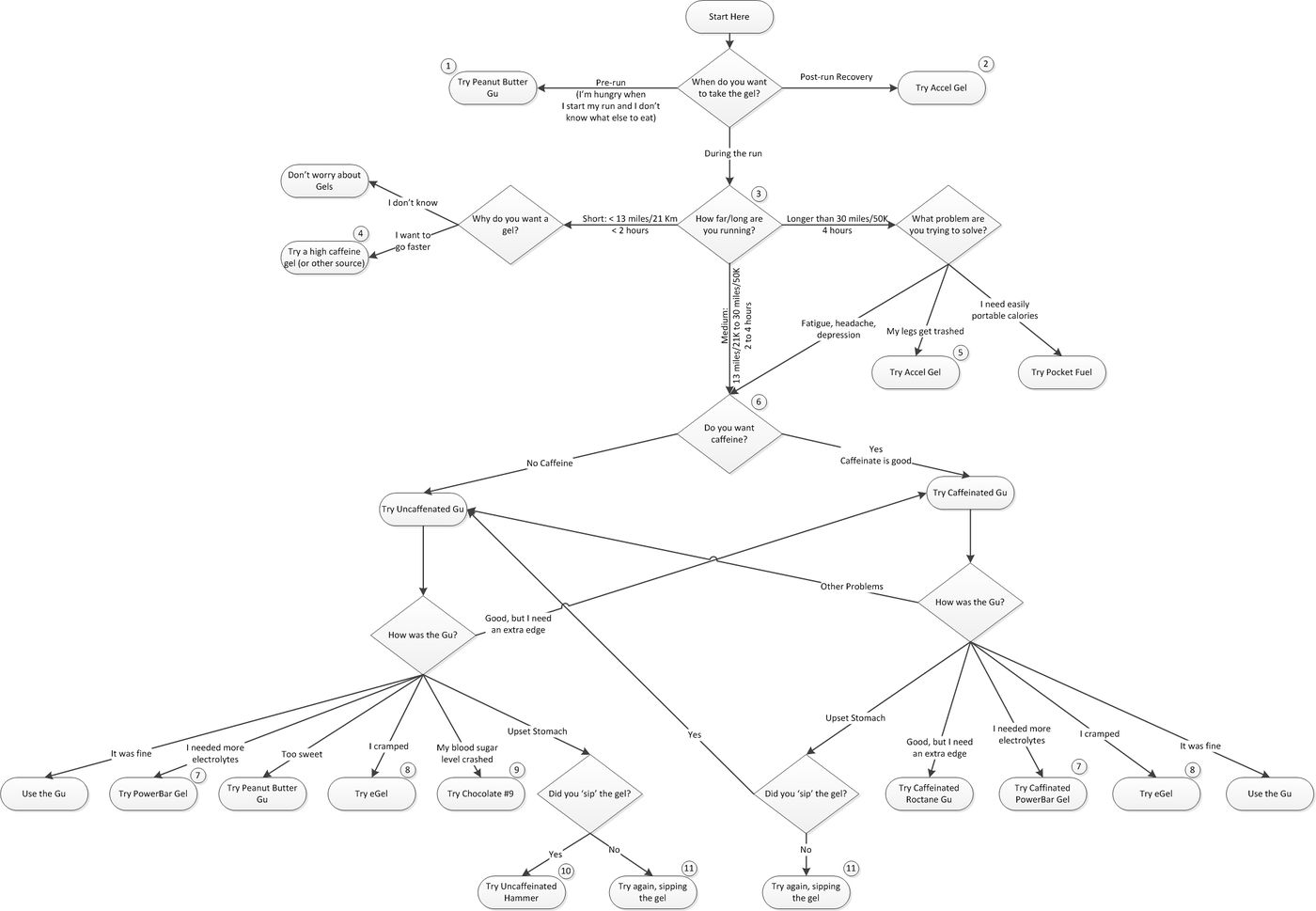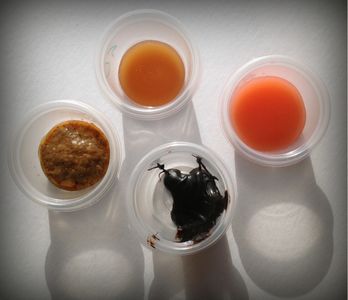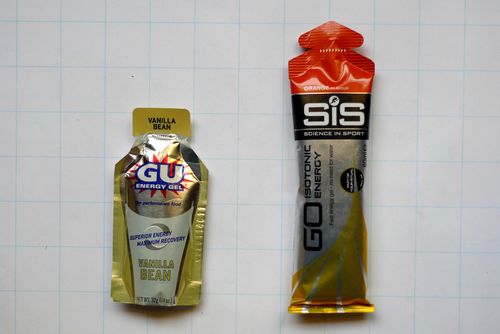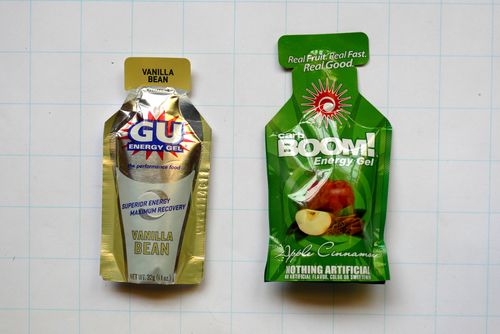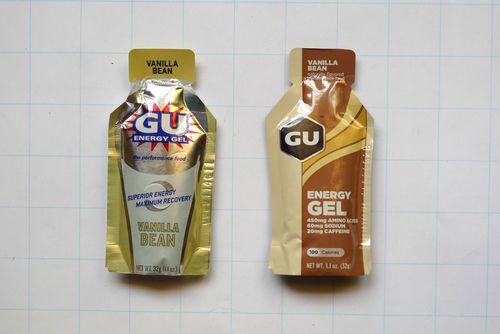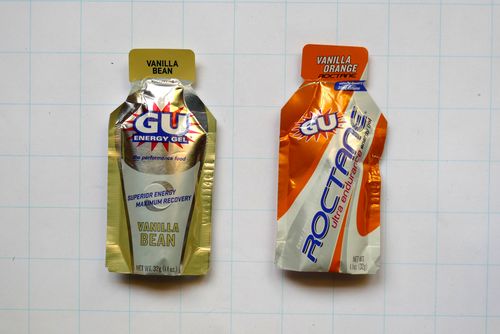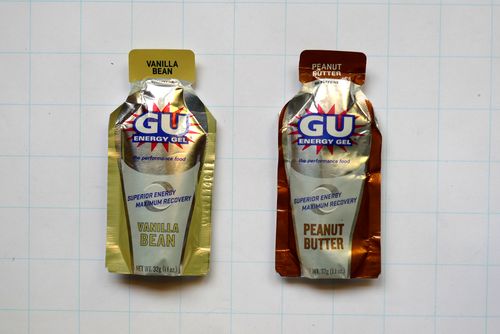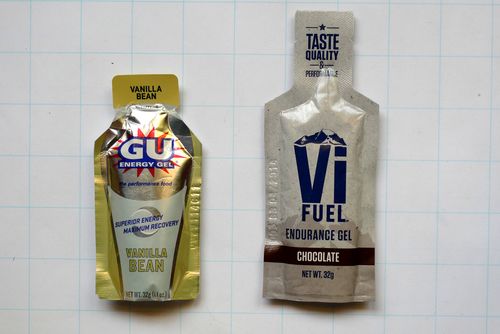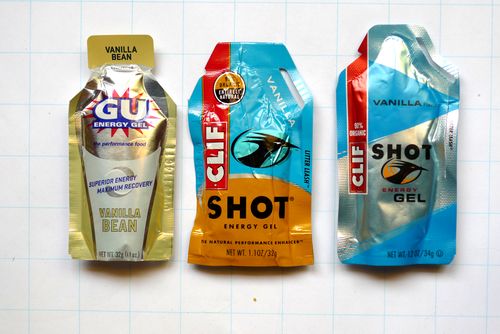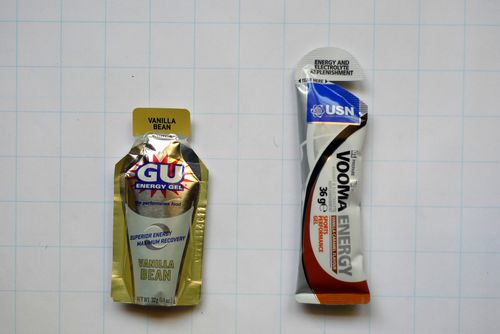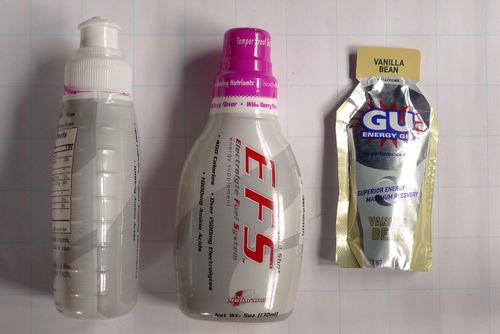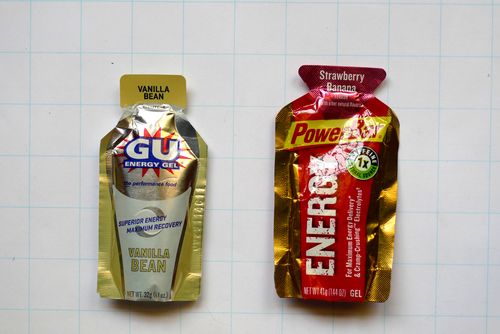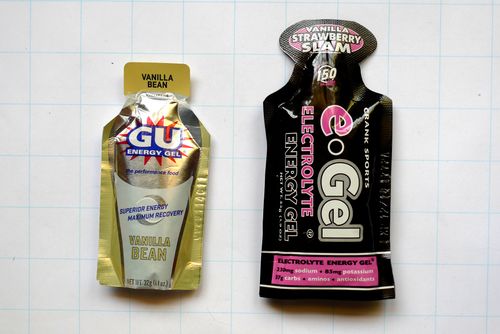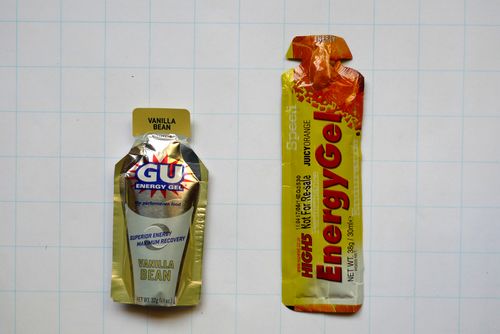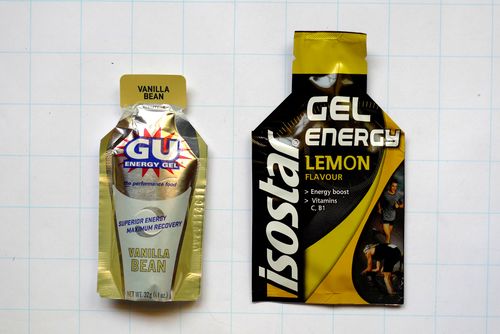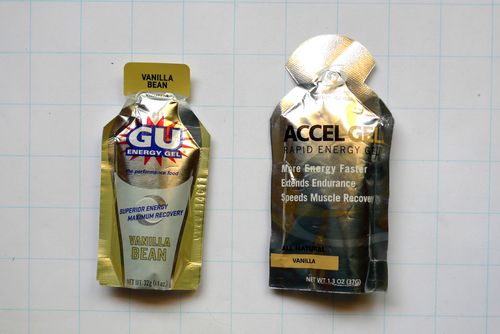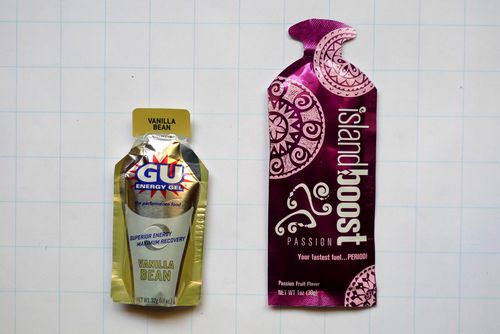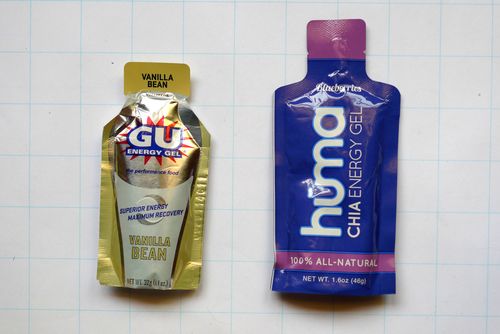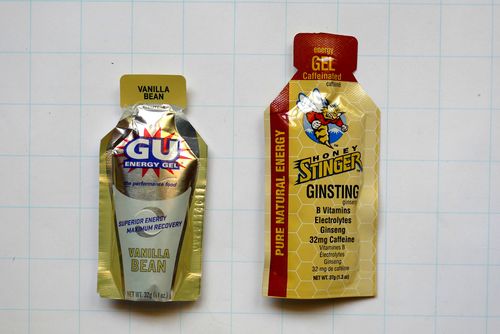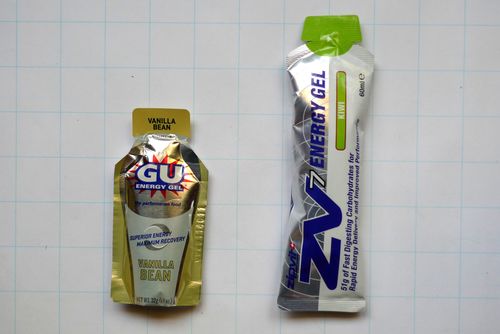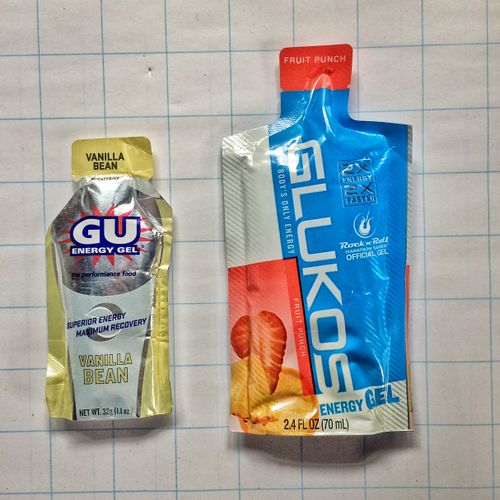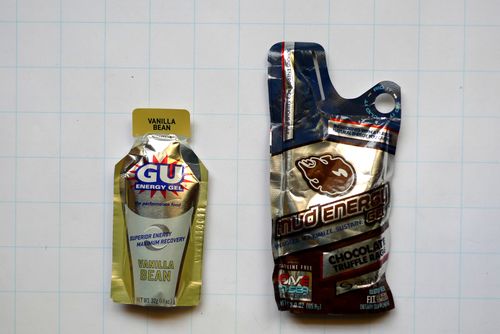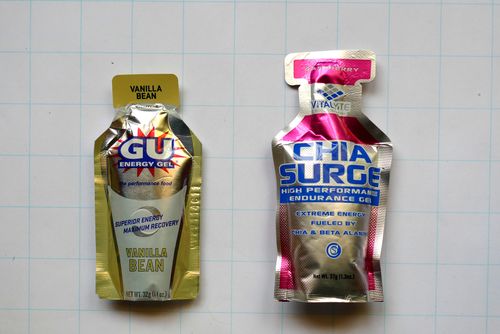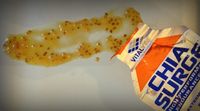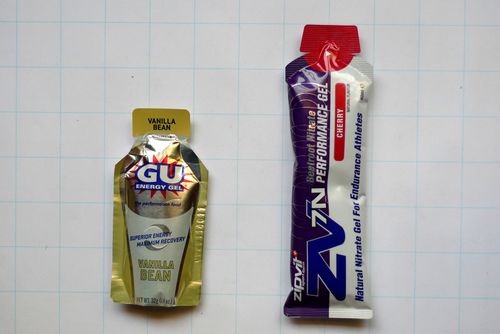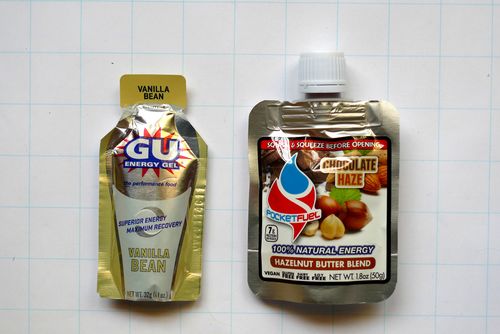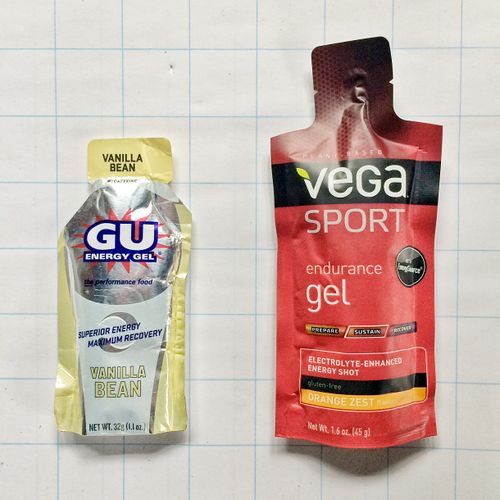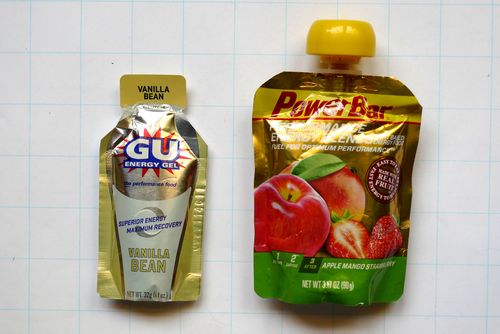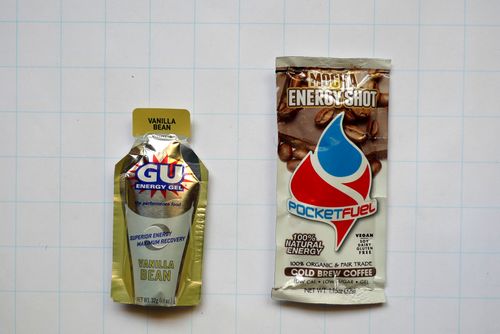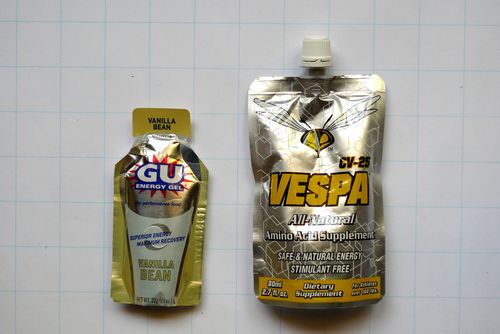A comparison of the best energy gels
Energy gels are a useful component of many endurance runners' training and racing. In marathon distance racing, energy gels can make an important difference if you know how and when to eat them. If you want a really simple guide to which gel to take, try this:
- For short runs (<13miles/2hr) you shouldn't generally need any fuel. The main reason for using a gel on a run this short would be if you're particularly hungry before you start running.
- For long runs (>30miles/4hours) you probably need more than gels. People vary, but most runners seem to find that gels become unappealing and sometimes nauseating over a protracted time. I suspect this might be because they are so easily absorbed they don't give your digestive system anything much to work on. They also typically only provide a simple fast acting carbohydrates and over a longer time. You need a greater variety.
- Caffeine is your friend, so unless you're running close to bed time, use it.
- The best all round gel I've found is still Gu, and you could think of it as the Honda civic of energy gels. For most runners this is an ideal starting point.
- If you're a competitive marathon runner looking for every edge, then I think it's worth a little extra to buy the Gu Roctane.
- For those suffering from cramps, try eGel (the sour flavor might help.)
- If you want more electrolytes, try PowerBar Gel.
- Hammer gel is a little easier to digest than Gu, so try that if you're having digestive problems.
1 Which Gel?
The flowchart below is intended to provide some general guidance around which gel to choose.
- Energy gels are easy to digest, but they can spike your blood sugar, so ideally take one within 5 minutes or so of starting the run. I think the Peanut Butter Gu is a good option as it has a little bit of fat and isn't too sweet, but other gels will work well. If you need something more substantial, consider a meal replacement drink like Ensure.
- An Accel Gel is a good option as far as gels go, but you're better off with something more substantial like a meal replacement drink (Ensure, etc.) or a chocolate milk. I'd only use Accel Gel if I needed something post run that I had to carry on the run itself.
- The time and distances here are broad guidelines. Generally you shouldn't need carbohydrate support for shorter runs, but if you're Glycogen depleted from a long run, then a Gel might be useful. On ultra-distances, carbs and gels become less important and you start needing more "real food".
- Caffeine can improve performance at all distances, but for shorter distances, it's probably best to take it before the run. Consider a Red Bull or other caffeinated beverage, or even caffeine tablets. I'd avoid coffee as there is evidence that you don't get the same benefit from caffeine when it's in coffee.
- A little protein can help offset muscle damage, and so swapping your carbohydrate based gel for an Accel Gel might be good on ultras. However, you should be looking at other fuel sources in an ultra for most of your calories.
- Caffeine can improve performance at all distances, and a gel can be a convenient way of taking it. Note that Caffeine can trigger some digestive problems in some people, and other forms of Caffeine might be easier pre-run. Consider a Red Bull or other caffeinated beverage, or even caffeine tablets.
- You can sweat out a lot of sodium when sweating heavily, with estimates as high as 5,000mg/hour in some cases. In those situations, even the 200mg of PowerBar gel is not much, but it may help. The sodium in a PowerBar gel could help augment the limited sodium you would get in most sports drinks. (See The Science Of Hydration for details.)
- There is some evidence that pickle juice can help with Cramps, and that it is the taste rather than the absorption of the pickle juice that helps. Therefore it is possible that the sour, tart flavor of eGels might help deal with cramps.
- Reactive hypoglycemia is where consuming carbohydrate causes your blood sugar to rise, and then the resulting insulin release causes a blood sugar crash. This is believed to be quite rare and even rarer during exercise. If you think you suffer from this problem, I would advise you to verify this by checking your Blood Glucose. The meters are cheap and easy to use.
- As well as Hammer gel, consider Carb BOOM or SIS Isotonic gels.
- See How to eat a Gel for details.
1.1 DIY Gels
It is fairly easy to mix up your own gel, and this allows you to tweak the ingredients to your liking. You can have specific flavors, different concentrations, unusual ingredients like Choline, etc., which is not possible with a commercial gel. If you're intending to use a flask instead of packets, then the DIY approach is well worth considering, but I've found it tough to recreate the commercial packaging at home. The Planted Runner uses a modified FoodSaver bag and includes a recipe. This is probably a much better approach than trying Ziploc bags.
2 Gel Ingredients
Here is an overview of the major ingredients in gels (see The Science of Energy Gels for more details).
- Maltodextrin is the most easily digested form of carbohydrate, 36% faster than glucose, making it ideal in a gel. More importantly, Maltodextrin requires far less water to be isotonic than glucose or Fructose. Maltodextrin has little or no flavor, even at high concentrations.
- Glucose is easily digested, but requires 6 times as much water as Maltodextrin to be isotonic. Glucose is about three quarters as sweet as sugar (sucrose).
- Note that 97% of brown rice syrup is a mixture of maltose, which is 2 glucose molecules and maltotriose which is 3 glucose molecules. For practical purposes it can be considered the same as glucose, though possibly contaminated with arsenic.
- A little bit of Fructose is useful, as Fructose is absorbed via different pathways, increasing the total carbohydrate absorption above what is possible with Maltodextrin alone. However, too much Fructose will cause digestive problems and Fructose is absorbed at about a forth the rate of glucose. It also requires the same amount of water as glucose to be isotonic. Fructose is 1.7x as sweet as sugar (sucrose).
- Sugar is a cheap ingredient and is half glucose and half Fructose.
- Fat can make a gel more palatable and is a useful fuel source at ultramarathon distances.
- Some protein can provide an additional fuel source and help limit the tendency of your body to cannibalize muscle for fuel.
- Amino acids may help performance, but the evidence is unclear at the levels provided in most gels.
- Caffeine is great for improving performance and speeding the absorption of carbohydrate, but too much can upset the stomach.
- Flavor is important, as you won't want to take an unpalatable gel. Experiment with different flavors, as different people have different tastes, and what flavor appeals can vary with circumstance. I add some comments around taste, including sweetness, bitterness, sourness and if the overall flavor is like candy or like fruit. Strong sour (acidic) flavors may help with Cramps. Genetics also influences taste, so such as the ability to detect some bitter flavors.
3 Overview
This table is a combination of the science of nutrition, personal experience and the experience of many runners I've talked to, with more details given below.
| Name | Calories | Carbs | Sugard | Maltodextrina | Glucosea | Fructosea | Other Carbs1 | Protein | Fat | Sodium | Potassium | Caffeine | Water to
be Isotonice |
Water to be Isotonic (per 100 cal) | Weightf | Carbs/g | Cal/g | Ease of digestion | Viscosityi | Recommended for |
|---|---|---|---|---|---|---|---|---|---|---|---|---|---|---|---|---|---|---|---|---|
| Gu | 100 | 25 | 5 | 20 | 0 | 5 | 0 | 0 | 0/2 | 50 | 40 | 0/25/50 | 175 | 175 | 32 | 0.78 | 3.13 | 10.0 | Thick | General Use |
| Gu Roctane | 100 | 25 | 5 | 20 | 0 | 5 | 0 | 1.7 | 0 | 125 | 55 | 0/35 | 201 | 201 | 32 | 0.78 | 3.13 | 9.6 | Thick | Those looking for every advantage |
| eGel | 150 | 37 | 7 | 30 | 0 | 7 | 0 | 0 | 0 | 230 | 85 | 0 | 295 | 197 | 55 | 0.67 | 2.73 | 9.5 | Thick | A PowerBar Gel Alternative, might help with Cramps |
| Peanut Butter Gu | 100 | 20 | 5 | 15 | 0 | 5 | 0 | 1 | 1.5 | 65 | 60 | 0 | 164 | 164 | 32 | 0.63 | 3.13 | 9.4 | Very Thick | A less sweet Gu |
| Mountain Fuel SportsJelly | 82 | 20 | 7 | 13 | 4 | 3 | 0 | 0 | 0 | 27 | 30 | 0 | 149 | 182 | 60 | 0.33 | 1.37 | 9.0 | Thin | Low energy density |
| SIS Isotonic | 86 | 22 | 0.6 | 21.4 | 1 | 0 | 0 | 0 | 0 | 10 | 0 | 0 | 47 | 55 | 60 | 0.37 | 1.43 | 8.9 | Liquid | Light, easy to digest, but big |
| Hammer Gel | 90 | 23 | 2 | 21 | 1 | 1 | 0 | 0 | 0 | 20 | 0 | 0/25/50 | 103 | 115 | 33 | 0.70 | 2.73 | 8.6 | Thick | Sensitive Stomachs |
| Carb BOOM | 110 | 27 | 3 | 24 | 2 | 2 | 0 | 0 | 0 | 50 | 50 | 0 | 145 | 132 | 41 | 0.66 | 2.68 | 8.5 | Thick | Hammer Alternative |
| High5 EnergyGel | 92 | 23 | 3 | 20 | 2 | 1 | 0 | 0 | 0 | 20 | 0 | 0 | 122 | 132 | 30 | 0.77 | 3.07 | 8.3 | Liquid | A less sweet Gu Alternative |
| USN Vooma Energy | 100 | 23.8 | 7.9 | 15.9 | 5 | 3 | 0 | 0 | 0 | 100 | 50 | 30 | 228 | 228 | 36 | 0.66 | 2.78 | 7.7 | Liquid | A Gu Alternative |
| Clif Shot (new formula) | 100 | 24 | 12 | 12 | 6 | 6 | 0 | 0 | 0/1.5 | 90 | 50 | 0/25/50/100 | 292 | 292 | 34 | 0.71 | 2.94 | 7.4 | Thick | A Gu Alternative |
| VFuel | 100 | 23 | 6 | 17 | 6 | 0 | 0 | 0 | 1 | 10 | 15 | 10 | 168 | 168 | 32 | 0.72 | 3.13 | 7.1 | Thick | Fructose malabsorption |
| EFS Energy Shots (per quarter shot) | 100 | 25 | 12.5 | 12.5 | 9 | 3 | 0 | 0.25 | 0 | 100 | 72.5 | 0 | 313 | 313 | 32.5 | 0.77 | 3.08 | 6.7 | Thick | The flask approach might suit some |
| TORQ Gel | 114 | 29 | 11 | 18 | 0 | 11 | 0 | 0 | 0 | 0 | 0 | 0 | 252 | 221 | 45 | 0.64 | 2.53 | 6.6 | Moderate | A lot of fructose, Very sweet |
| Precision Fuel 30 | 120 | 30 | 12 | 18 | 0 | 12 | 0 | 0 | 0 | 0 | 0 | 0 | 266 | 222 | 51 | 0.59 | 2.35 | 6.3 | Thick | No Electrolytes |
| PowerBar Gel | 110 | 27 | 10 | 17 | 0 | 10 | 0 | 0 | 0/1.5 | 200 | 20 | 0/25/50 | 293 | 267 | 41 | 0.66 | 2.68 | 6.0 | Thin | Those needing extra electrolytes |
| Chia Surge | 75 | 17 | 11 | 6 | 11 | 0 | 0 | 0 | 1 | 4 | 26 | 0 | 215 | 287 | 37 | 0.46 | 2.03 | 5.2 | Very Thick | Not Recommended |
| ISOStar | 112 | 28 | 15.8 | 12.2 | 16 | 0 | 0 | 0 | 0 | 80 | 0 | 0 | 357 | 318 | 35 | 0.80 | 3.20 | 4.7 | Near Liquid | Not Recommended |
| SIS Beta Fuel | 158 | 40 | 19 | 21 | 0 | 19 | 0 | 0 | 0 | 30 | 0 | 0 | 419 | 265 | 60 | 0.67 | 2.63 | 4.5 | A lot of fructose | |
| Accel Gel | 100 | 20 | 13 | 7 | 4 | 9 | 0 | 5 | 0 | 115 | 30 | 0/20 | 297 | 297 | 37 | 0.54 | 2.70 | 4.3 | Thick | Improved Recovery and Ultradistances |
| 2nd Surge | 90 | 18 | 13 | 0 | 5 | 8 | 53 | 3 | 0 | 115 | 15 | 100 | 274 | 304 | 30 | 0.60 | 3.00 | 4.3 | Thick | Not Recommended |
| Huma Chia | 100 | 22 | 18 | 0 | 13 | 5 | 3 | 1 | 1 | 105 | 30 | 0 | 356 | 356 | 46 | 0.48 | 2.17 | 4.2 | Thick | Not recommended |
| Glukos | 60 | 16 | 16 | 0 | 16 | 0 | 0 | 0 | 0 | 15 | 150 | 0 | 280 | 466 | 70 | 0.23 | 0.86 | 2.4 | Moderate | Not Recommended |
| Maurten Gel 100 | 100 | 25 | 25 | 0 | 14 | 11 | 0 | 0 | 0 | 20 | 0 | 0 | 466 | 466 | 40 | 0.63 | 2.50 | 1.8 | Thick, Jelly | Consider only if GI issues with other gels (Try mountian fuel first) |
| Honey Stinger | 120 | 29 | 29 | 0 | 14 | 15 | 0 | 0 | 0 | 50 | 85 | 0/32 | 572 | 477 | 37 | 0.78 | 3.24 | 0.5 | Near Liquid | Not Recommended |
| Chocolate #9 | 70 | 15 | 13 | 0 | 3 | 10 | 2 | 1 | 1 | 75 | 0 | 0 | 256 | 365 | 30 | 0.50 | 2.33 | 0.0 | Very Thick | Not Generally Recommended |
Notes
- Sodium, Potassium, and Caffeine are in mg, water is in ml, everything else is in grams.
- a These values are estimates based on the stated nutrition and ingredients.
- bAgave nectar varies in its Fructose content between 90% and 55%, so this calculation assumes the average of about 75%.
- cThe unusual nature of the ingredients in 2nd surge makes it harder to estimate the types of carbohydrates included.
- dThe sugar value includes sucrose, Fructose, glucose and other 'sugars'.
- eThis is an approximation based on the amount of sugar, Maltodextrin, sodium and potassium, ignoring other ingredients. The water included in the gel is assumed to be the overall weight less the weight of the carbs, fat and Protein. See The Science of Energy Gels for details on the isotonic calculations.
- fThis is the net weight of the gel; generally the packaging added 2-3g to the gels according to my scales.
- gThe chocolate flavor has 1.5g
- hThe chocolate flavor has 2g
- IViscosity, or thickness, varies enormously between gels. The thickest, Chocolate #9 is more like a paste than a gel, while the thinnest, PowerBar Gel is a liquid.
- kIt's hard to estimate the ratio of fructose to glucose in Huma. I've assumed a 1:1:1 ratio of fruit, sugar, & brown rice syrup. The Fruit is about 40% glucose, sugar is 50% and brown rice syrup is 100%, giving about 30% fructose.
4 Visual Comparison
5 Hammer Gel
Hammer Gel is noteworthy as one of the easiest to digest gels. It is nearly all Maltodextrin dissolved in a greater volume of fluid than other gels. The low level of sugars and electrolytes makes this far easier on the digestive system, and is recommended for runners who have issues with other types of gel. There is less Fructose, which makes the maximum carbohydrate absorption rate lower than other gels, so only use Hammer if Gu is difficult to digest.
Ingredients (Vanilla): Maltodextrin, Filtered Water, Energy Smart (Grape juice and Rice dextrins), Potassium Sorbate (as a preservative), Vanilla Extract, Citric Acid, Potassium Chloride, Salt, Amino Acids (L-Leucine, L-Alanine, L-Valine, L-Isoleucine).
6 SIS GO Isotonic
This SIS GO Isotonic gel is rather different to most others on the market, and in many ways it's more of a small drink than a gel. The packet is roughly twice as big as most standard gels, which makes it awkward to carry. The flavor is extremely light and I would almost describe it as bland. This is a gel that's worth considering if you're having problems digesting more mainstream gels or if you want something with little or no flavor, and you don't mind carrying the bulk. (Note that this gel is much easier to find in Europe.)
Ingredients (Orange): Water, Maltodextrin, Natural Flavoring, Gelling Agents (XanthanGum, Gellan Gum), Acidity Regulators(Citric Acid, Sodium Citrate),Preservatives (Sodium Benzoate, Potassium Sorbate), Sweetener (AcesulfameK), Sodium Chloride, Antioxidant (Ascorbic Acid), Color (Beta-Carotene.
7 Carb BOOM
Carb BOOM is similar to Hammer Gel, with a lot of Maltodextrin and a little bit of fruit. Each packet of Carb BOOM is about 25% larger than Hammer Gel, but contains similar ingredients (slightly more electrolytes). The flavors are a little more like real fruit than the candy flavor of many gels.
Ingredients (Apple Cinnamon): Maltodextrin, Water, Apple Puree, Apple Concentrate, Citric Acid, Potassium Citrate, Sea Salt, Cinnamon, Potassium Sorbate and Sodium Benzoate.
8 Gu
For marathon distance racing, I prefer Gu over all other gels I've tried. You could think of Gu as the Honda Civic of energy gels; it's not perfect for everyone in every situation, but it's a great all-rounder. It contains 5g of Fructose, with the rest of the calories coming from the easily digested Maltodextrin. Like many other gels, I find that Gu can be consumed without any extra water as long as it is taken a bit at a time and mixed with saliva. Some of the flavors can be a little strong and candy like, but the 'plain' Gu has a light cola flavor. Gu is slightly thicker than other gels, which I find makes it easier to mix the gel with saliva, but it can become overly thick in colder (freezing) conditions. (Note that the chocolate flavor has 2g of fat.)
Ingredients (Vanilla): Maltodextrin, water, Fructose, Gu Amino acids (leucine, valine, histidine, isoleucine), potassium and sodium citrate, antioxidants (vitamin E and C),citric acid, calcium carbonate, vanilla, sea salt, preservatives (sodium benzoate, potassium sorbate), fumaric acid, herbal blend (chamomile, kola nut, ginger), pectin.
9 Gu Roctane
Roctane is a more expensive variant on Gu, though the price has reduced significantly since its introduction. The main difference is the addition of 1.7g of amino acids, which may help slightly. Roctane is not as thick as the standard Gu. I've not noticed any difference when using it, but if you like Gu and are looking for even a slight advantage, it may be worthwhile. If you are paying hundreds of dollars for a race entry and travel, then the extra cost is minor. If you take 8 gels in a 4-hour marathon, Roctane only adds $4-5 to the cost of the race. Of course, you'll need to practice with Roctane in your training, so you'll have to factor that cost in as well.
Ingredients (Blueberry flavor): Maltodextrin, water, Fructose, Roctane Amino acids (Histidine, Leucine, Valine, Isoleucine), Ornithine Alpha-ketoglutarate (OKG), sodium citrate, malic acid, citric acid, potassium citrate, natural pomegranate flavor, natural berry flavor, calcium carbonate, sea salt, Caffeine, sodium benzoate, potassium sorbate.
10 Gu (Peanut Butter)
The peanut butter flavored Gu is different enough to justify its own entry. The peanut butter flavor is far less sweet than the regular Gu flavors, but if you like peanut butter it can be a lot more palatable. It also substitutes a little bit of fat and Protein for the carbohydrate, as well as having a tiny bit more sodium and Potassium. I find this flavor digests particularly well and I'd recommend trying get if you're a fan of peanut butter. Obviously, if you hate peanut butter or you have a peanut allergy this is not going to work for you. The Peanut Butter flavor is one of the thickest gels, and is quite a bit thicker than the other flavors of Gu. Even in warm conditions it tends to be a little too thick, and in cold conditions it can become bit like a chewy candy such as taffy, toffee, etc.
Ingredients: Maltodextrin, water, Fructose, Peanut butter (peanuts, salt), Gu Amino acids (leucine, valine, histidine, isoleucine), potassium and sodium citrate, antioxidants (vitamin E and C), preservatives (sodium benzoate, potassium sorbate), calcium carbonate, sea salt, fumaric acid, calcium chloride, pectin, citric acid, malic acid, herbal blend (chamomile, ginger).
11 VFuel
VFuel Gels have no Fructose, so it's ideal for those that suffer from fructose malabsorption. It has a little fat in the form of Medium Chain Triglycerides (MCT), as well as some Taurine, which I think are good things, but probably the amount is not significant enough to make much of a difference. Note that MCT can cause serious digestive problems, but probably not at these levels. There is a little Caffeine, intended to increase the carbohydrate absorption rather than to improve performance. I found the VFuel very easy on the stomach and a worthy alternative to Hammer Gel. (Note VFuel was previously called Vi Endurance.)
Ingredients (Vanilla): Maltodextrin, water, dextrose, VFuel Endurance Formula (MCT Oil, Taurine, Glucuronolactone, ornithine alpha-ketoglutarate (OKG), citrulline malate, Magnesium aspartate, sodium citrate, potassium aspartate), pure vanilla flavor, potassium sorbate, sea salt, Caffeine
12 Clif Shot (new formula)
The new formula Clif Shot uses Maltodextrin like other Gels and is similar to Gu. However, it has slightly more sugar making it a little more difficult to digest. Clif Shots require about twice the water to be isotonic compared with Gu. One nice thing about Clif Shots is their 'litter leash', which is a thin strip that holds the top to the body of the packet so that you're less lightly to drop the top. I found in practice that I often break the leash when opening the gels, but the idea is a noble one. (Note that the chocolate flavor has 1.5g of fat.)
Ingredients (Vanilla): Organic Maltodextrin, Organic Sugar, Water, Natural Flavor, Sea Salt, Potassium Citrate.
13 USN Vooma Energy
USN Vooma Energy is a European Gel has quite a strong flavor, but it is a soft, rounded flavor that I rather like. Vooma has a thinner consistency than most gels which makes it easy to swallow on the run. Overall, I've found myself looking forward to these gels more than most. The packets are also narrower and taller, which I found worked well, and made it easier to extract all the gel from the packet. (Note that this gel is generally only available in Europe.)
Ingredients (Vanilla Caramel): Water, Maltodextrin, Dextrose, Sucrose, Acidity regulators (Sodium Citrate E331i; Potassium citrate E332i), Creatine Monohydrate, Ascorbic Acid, L-Carnitine, Branched Chain Amino Acids (BCAAs)(L-Leucine, L-Valine, L-Isoleucine), Acidulant (Citric Acid), Sodium Chloride, Flavoring, Preservative (Potassium Sorbate), Glutamic Acid, Thickener (Xanthan Gum).`
14 EFS Liquid Shot
The most unusual thing about EFS is that it comes in a small plastic flask that holds the equivalent of about four normal gel packs. I rather like the idea of a small flask as you can take as much or as little as you feel like, something that's a bit trickier with a foil package to gel. Flask is also reusable which is nice, but I found it a little larger than I would like. While it sits very nicely in my hand, I wouldn't want to hold it for any significant distance, and it's a bit too heavy to put into running shorts. EFS make some impressive claims for their gel, but on closer inspection they become far less impressive:
- No "gelling agents, which slow down absorption and digestion." This sounds really good, until I realized that none of the gels contain any type of "gelling agent." Energy gels are the viscosity they are due to the quantity of carbohydrate, effectively making a thick paste.
- Contains "400 calories." This is a little misleading, as the EFS is the equivalent in size, weight, and cost to consuming for standard gels. If you compare like-four-like and look at a quarter of a flask, then the EFS has a reasonably standard hundred calories.
- A "supercharged endurance formula." I'd argue that EFS is a rather pedestrian and sub optimal blend of carbohydrates. It's half simple sugars, as a blend of dextrose and table sugar, and half Maltodextrin. These simple sugars mean you needed to consume rather more water to make EFS isotonic than the better quality gels like Gu.
- "Over 1500mg electrolytes (so you don't need to bother taking extra electrolyte pills)." If he can normalize it down to a standard gels serving, then EFS contains 100mg of sodium, which is a little better than some energy gels, but far from ideal when you consider the amount of fluid that has to be consumed to make it isotonic. I estimate you need to take over 300mL/10oz of water with a quarter of an EFS flask. That's a little less sodium than you'd get from simply drinking the same quantity of Gatorade which is itself a pretty crappy source of electrolytes. For context, The Science Of Hydration suggests that a non-heat acclimated runner that is sweating heavily could lose over 5,000mg of sodium/hour.
- "1000mg of amino acids." There is some evidence that amino acids may improve endurance, but normalizing down to the standard gel, EFS only provides 250mg of amino acids, rather less and something like Gu Roctane.
- It's a "liquid?" I expected EFS Liquid Short to be a liquid, not a gel, so I was surprised that it was only a little thinner than most other gels. It's not quite as thick as a Gu, but it's far thicker than USN Vooma Energy, SIS Isotonic, Island Boost, or High5 EnergyGel. Personally, I rather like this consistency, but the "liquid" in the name is distinctly misleading.
Overall, I found EFS to be an adequate, if not particularly great energy gel. If you like the idea of the small flask, then you could either refill the EFS flask with a better quality gel or purchase something like the Fuel Belt Gel Flask which I've used in the past.
Ingredients: Complex carbohydrates, Dextrose, Sucrose, Water, Amino Acid Blend (L-Glutamine, Leucine, Iso-Leucine, Valine), Salt, Potassium Chloride, Calcium (as calcium complex), Magnesium (as magnesium glycine amino acid chelate), natural flavors, citric acid, sorbic acid and sodium benzoate (to preserve freshness)
15 PowerBar Gel
PowerBar Gel is noteworthy because of its higher sodium content that may help alleviate Hyponatremia and Cramps. I found the flavor stronger than Hammer, Gu or Cliff, but still quite pleasant. The flavors are generally rather more candy like than fruit like. The level of Fructose is higher than I'd like to see for digestibility. You may need to drink some water near the time you take PowerBar Gel due to the extra electrolytes. PowerBar Gel has a noticeably thinner consistency than most other gels, and is almost a liquid. This makes it far easier to take in cold weather as it does not go so thick, but it also make it trickier to mix with saliva in your mouth. (Note that the chocolate flavor has 1.5g of fat.)
Ingredients (vanilla): Carbohydrate blend (Maltodextrin, Fructose), water, electrolytes (sodium chloride, sodium citrate, potassium chloride), natural flavor, citric acid, sodium benzoate and potassium sorbate.
16 eGel
The main ingredients in eGel are close to Gu, which is no bad thing. The main differences are that eGel is twice the size of Gu, does not come in caffeinated varieties and has more electrolytes. While eGel has more electrolytes per packet than PowerBar Gel, if you take size into account then PowerBar Gel has the most concentrated electrolytes. The size of eGel may appeal to some people, but I generally find the usual size more convenient. The flavors of eGel are somewhat unusual in that they taste quite sour or 'tart', possibly because of the citric acid content. Flavor is a personal thing, so if you like sour, tart tastes, then you may get on well with eGel, but I found it overwhelming. However, it's possible that eGel may be acidic enough to help with cramping.
Ingredients (Mountain Rush): Maltodextrin, Filtered Water, Fructose, Citric Acid, Sodium Citrate, Potassium Citrate, Natural Flavor, Amino Acid Blend (Leucine, Valine, Isoleucine, Histidine), Vitamin C (Ascorbic Acid), Vitamin E (Tocopherol acetate), Sodium Benzoate And Potassium Sorbate, Vitamin B6
17 High5 EnergyGel
This High5 gel has a slightly sweet taste with a mild orange flavor. This light flavor makes the gel worth considering if you want to avoid the sweeter flavors that are common in other gels. High5 has a very thin, almost a liquid consistency that makes it easy to take. This gel falls down because it has so little Fructose compared with competing gels, which reduces the rate of carbohydrate absorption. (Note that this gel is generally only available in Europe.)
Ingredients (Orange): Glucose, Water, Maltodextrin, Fruit Juice (min 15%, Orange/Lemon),Sea Salt, Sodium Benzoate, Potassium Sorbate
18 ISOStar Gel
This gel contains a lot of sugar, making it a little slower to digest and requires a lot more water to be isotonic. I found the flavor rather too sweet, and while the sweetness was offset by a strong lemon sharpness, the overall taste was a little overpowering. They claim a "Cardio Pump vasodilator", but I didn't find any supporting scientific evidence, nor did I detect any unexpected performance change when I took this gel. (Note that ISOStar is a Finnish company, and this gel is generally only available in Europe.)
Ingredients (Lemon): Wheat glucose syrup, water, natural flavouring, CARBO PUMP complex (dry extracts of apples and grapes 0.22%, vitamins C and B1), Acidifier: citric acid, preservatives: potassium sorbate and sulphur dioxide.
19 Accel Gel
I like the 4:1 carbohydrate to Protein ratio of Accel Gel, and I often use it in ultramarathon races. There is more sugar than I would like at 13g and combined with the protein, this gel is going to be harder to digest. The thin consistency makes it harder to eat slowly and mix with saliva. Consider this for recovery when there's not going to be anything else convenient, or for ultras in the 50 mile/100K range.
Ingredients (Vanilla): Water, Fructose, Sucrose, Whey Protein Isolate and Hydrolysate, Maltodextrin, Glycerin, Natural Flavors, Salt, Ascorbic Acid, Vitamin E Acetate, Soy Lecithin.
20 Island Boost
Island Boost makes lots of claims that don't stand up to scrutiny. They claim that its glucose is "the fastest energy source", even though Maltodextrin is faster and their Fructose is quite slow. They imply you don't need to take water with their gel, even though the simple sugars need more water than a Maltodextrin based gel. You'll notice that Coconut Water is rather a long way down the ingredients list, below water, so you're getting less than 25% coconut water and possibly a lot less. The calorie density is quite low and the overall calories are low at 70 (passion fruit flavor only has 60 calories.) It's a liquid consistency, which makes it harder to eat slowly and mix with saliva. This is the only gel I've ever tried where tearing the top off didn't actually open the gel, which would be a problem in a race. The flavor is quite sweet, and more candy than fruit, but fairly light. Not a recommended gel.
Ingredients (Chocolate):Glucose, Fructose, Water, Coconut Water, Cocoa, Vanilla, Sodium, Potassium Sorbate, Calcium Sulfate.
21 Huma Chia Energy Gel
Huma Chia makes some bold claims about their gel, but the reality does not match the promise. Huma prominently use Chia seeds, but Ground Chia Seeds are far down the ingredients list indicating they are only present in smaller amounts. From the nutrition data I'd estimate that you're only getting about 2-3g of Chia seeds in each gel. The texture is slightly course due to the seeds, which is why I guess they didn't put more in. However, it's nothing like the problems I found with "Chia Surge' that contains the whole seeds rather than grinding them up. The main ingredients in Huma are fruit puree, table sugar and brown rice syrup, all providing simple sugars. This is the same brown rice syrup that gave Clif Shots such a bad name before they changed their formula. Brown Rice Syrup has a bitter aftertaste and unfortunately may contain arsenic. Huma claims "100% natural", but I'm not sure I would call brown rice syrup "natural" given how it's processed with enzymes. The flavor is quite strong, and a balance of sweet, bitter and sour (tart). Huma is not as sour as eGel, but it's noticeable and probably comes from the citric acid. However, I found the bitterness of the brown rice syrup quite noticeable and unpleasant, with a bitter aftertaste that lasts for miles. The flavor is more fruit than candy, but it's not a taste I would look forward to. While I'm a fan of Chia seeds in general, I don't think this gel works and I don't recommend it.
Ingredients (Strawberry): Strawberry Puree, table sugar, water, brown rice syrup, ground chia seeds, sea salt, citric acid.
22 Honey Stinger
Honey contains only simple sugars rather than the more quickly and easily digested Maltodextrin that other Gels use. This means Honey Stinger requires nearly 6x the water to be isotonic compared with Hammer gel. In fact, you need over a pint of water (500+ ml) to be isotonic, which is generally impractical. . This is the one of the few Gels I've tried that has given me digestive problems when taken slowly. I also found the sweetness overpowering and unpleasant, though the honey aftertaste was quite nice. I would not recommend Honey Stinger Gels.
Ingredients (Gold flavor): Honey, Water, Potassium Citrate, Salt, Natural Flavors, Vitamins & Minerals, Niacinamide (Vit B3), Calcium Pantothenate (Vit B5), Pyridoxine, Hydrochloride (Vit B6), Riboflavin (Vit B2), Thiamine Mononitrate (Vit B1), Cyanocobalamin (Vit B12)
23 Zipvit ZV7/ZV7c
ZV7 is a larger gel, and as you can see from the picture below, it's about twice the size of a Gu. I much prefer the smaller size of the Gu (and similar gels) as it gives me the freedom of taking one or two gels as needed. The flavors of ZV7 seem enticing, but in practice I found they did not live up to the promise. The flavors I tried ended up being overly sweet, but the flavoring was a little thin. There's also a lot of sugar in ZV7, which makes it harder to digest than the better Gels. In fact, my estimate is that you'd need to take about a pint (half liter) of water with a packet of ZV7 to make it isotonic. The caffeinated versions are called "ZV7c".
Ingredients: Water, Maltodextrin, Sucrose, Glucose Syrup, Citric Acid, Natural Flavor, Potassium Sorbate, Sodium Chloride.
24 #9 Chocolate
The only ingredients in this #9 are Agave and Cocoa, and Agave is predominantly Fructose (55% Fructose to 20% glucose). This amount of Fructose is slow to be absorbed and can be difficult to digest, making it a poor choice for most runners. The Agave makes this gel intensely sweet, which I did not like and the 'processed with alkali' means that most of the antioxidants from the chocolate are destroyed. This is also by far the thickest gel that I've tested so far, being more like a paste than a gel. This gel may be suitable for runners that suffer from a blood sugar drop after taking more conventional gels prior to exercise (see The Science of Energy Gels for more details).
Ingredients: organic agave nectar, cocoa processed with alkali
25 Glukos
Glukos is the "OFFICIAL ENERGY GEL & of the Rock 'n' Roll Marathon Series", which (given the reputation of those marathons) could be considered a warning label. Like the races, the energy gel has lots of hype with a little to back it up. Glukos uses glucose as its only source of carbohydrate, which makes it rather harder to digest than a Maltodextrin/Fructose based gel. As a result, you need 280ml/9.5oz of water to make a packet isotonic, which doesn't seem too bad when compared with other gels until you realize that Glukos only provides 60 calories per packet. When you normalize the amount of water you need to make a gel isotonic based on 100 calories then Glukos can be seen to be one of the least effective energy gels I've tested. Because Glukos is a liquid, it's practically impossible to mix it with saliva as you consume it, compounding the digestion problems. It also weighs more than twice as much as a traditional gel like Gu, which means the energy density of Gu is nearly 4x that of Glukos. There is a woefully inadequate amount of sodium, and they've added coloring which seems rather pointless in a gel. Glukos claims that it is two times faster and has two times the energy, but you have to dig a little to find out what they're comparing it to. It turns out that they are claiming that Glukos is two times faster than sucrose (table sugar), which is reasonably true but rather irrelevant given that I'm not aware of any energy gel that is made predominantly from sucrose. The nearest you'd find is honey based gels as honey contains a mixture of fructose and glucose that's similar to sucrose. It's a little ironic that a gel containing roughly half the energy of standard gels would claim to have twice as much. The other part of the claim (2x faster) is far more dubious as sucrose and glucose have the same energy density. Their FAQ states "you don't lose energy to the processes of digestion or metabolization like other fuel sources", but I've never seen anything to suggest that the metabolism of fructose takes a significant amount of energy, let alone a factor of two. Glukos also claims things like gluten-free, dairy-free, soy-free, but that's true of virtually every gel on the market. The only good news is that the flavor is reasonably light, which is what you'd expect given that glucose is not as sweet as sucrose or fructose. It's rather like having a very small packet of Gatorade drink, which is no bad thing flavor wise.
Ingredients: Water, Glucose, Citric Acid, Potassium Citrate, Dipotassium Phosphate, Sea Salt, Natural Flavors, Purple Carrot Root (for color)
26 Mud Energy Gel
There are some unusual ingredients in Mud Energy Gel, including rather more protein than any other energy gel. The form of the protein is also a little strange, which is from Collagen, whey protein and brown rice protein. While whey protein is common in sports foods, collagen is rather unusual, and brown rice protein seems an even stranger choice. The gel includes Sustamine, a combination two amino acids to form L-Alanyl-L-Glutamine. There are some bold claims for Sustamine, but I couldn't find the research to back it up. The inclusion of Brown Rice syrup can create a bitter aftertaste, as well as possible contamination with arsenic. This gel is also rather large, coming in at about twice the size of a Gu or other gel, but it's only got about 50% more calories, making it too large for runners. Overall, the digestibility of Mud Energy Gel is a little poor, but I found the flavor to be a bigger problem. I realize that flavor is a personal thing, so I tried a sample of Mud on several people and it was met with universal distaste, and some people even thought I was playing a prank on them. The only thing I've found that has a similar flavor has been some "salty licorice". However, it's been noted that salty licorice is an acquired taste, and that people not familiar with it may find the taste "physically overwhelming and unlikeable." So maybe with more exposure, the flavor becomes better.
Ingredients: Coconut Water, Sweet Ground Chocolate (sugar, cocoa, chocolate liquor, vanilla), organic sugar, organic brown rice syrup, water, sea mineral concentrate, cultured sugar, xanthan gum.
27 2nd Surge
The ingredients in 2nd Surge are rather grim, with Agave providing Fructose and Brown Rice Syrup providing glucose (as disaccharides and trisaccharides). While this may sound better than simply using all sugar, it's chemically not an improvement, especially as Brown Rice Syrup has a bitter aftertaste and unfortunately may contain arsenic. I found that 2nd surge was overly sweet, with a slightly bitter undertones and rather gritty in texture. 2nd Surge has a higher dose of Caffeine than most gels. It's unlikely that you'd want to take a 2nd surge every 30 minutes, but if you did, you'd have 800mg of Caffeine during a four hour marathon, which is rather high. (For a 150 pound/75Kg person, that would be nearly 11mg/Kg, far more than seems prudent.) The ratio of carbohydrate to Protein can have some benefits, but it's a 6:1 ratio, rather than 4:1 which the manufacturer claims is ideal in their Accel Gel. Overall, there seems nothing to recommend these gels.
Ingredients (chocolate flavor): Agave syrup, brown rice syrup, evaporated cane sugar, water, whey Protein isolate, glycerin, pea Protein isolate, cocoa, natural flavors, green tea extract, d-alpha-tocopheryl, salt, grape, pomegranate, mangosteen, goji berry, blueberry, chokeberry, cranberry, apple and bilberry extracts.
28 Chia Surge
Chia surge is one of the more unusual gels as it contains chia seeds which give it a bitty texture. I found that these seeds got caught in my teeth, even when I tried to swallow without chewing or mixing with saliva, which was amazingly annoying. Chia surge also has relatively few calories, too much glucose, not enough Maltodextrin and almost no sodium. Chia Surge contains beta-Alanine which has been shown to improve sprint performance, though you'd likely need to take 4-12 packets a day for some days to see the benefit (see The Science of Energy Gels for more details). Overall it's hard to recommend Chia Surge.
Ingredients(Raspberry): Water, Dextrose, Maltodextrin, Citric Acid, Fruit And Vegetable Juice (For Color), Natural Flavors, ULS (Organic Cane Sugar, Natural Flavors, Stevia).
29 Zipvit ZV7N
This is an unusual gel because it contains Beetroot Juice, which may improve performance. This is a cool idea, especially for longer events where a boost in Nitrate levels might be helpful. However, even though I love the taste of beetroot as a vegetable, I find the taste of the gel to be a little nauseating and I've been unable to consume an entire packet. However, if you can cope with the flavor, then this is well worth considering.
Ingredients: Water, Beetroot Juice Concentrate, Maltodextrin, Sucrose, Potassium Sorbate, Citric Acid, Natural Flavor.
30 Other 'energy gels'
While these products look rather like energy gels, they don't meet my criteria for inclusion but are worth mentioning.
30.1 PocketFuel
Unlike energy gels, PocketFuel is a peanut butter like paste in an energy gel like packet. They are similar a little larger than most other gels (about 1.8oz/52g) but have far more calories (~280) due to their higher fat content. Be careful of the nutrition label, which quotes values for a 32 gram serving, even though the packet contains 52g. The label says each packet contains "about 2" servings, but is actually 1.6 servings. I've added a table below of the nutrition from an entire packet. I would not generally recommend PocketFuel for runs shorter than about 40 miles, but for longer races they make a convenient form of food. As you can see from the table below, there is a mix of fat and carbohydrate that I think is excellent for ultrarunning. I'm also really happy to see 5 g of fiber, something you might really, really appreciate the day after an ultramarathon! It's a shame there's not a little more salt, but that's my only quibble with the nutrition. Note that for some flavors the ingredients tend to settle and it's worth squishing the packet before your run to mix things up.
| Nutrient | Quantity |
|---|---|
| Calories | 276Cal |
| Fat | 20g |
| Sodium | 42mg |
| Potassium | 312mg |
| Carbs | 23g |
| Fiber | 5g |
| Sugar | 16g |
| Protein | 7g |
Ingredients (chocolate haze):Hazelnuts, almonds, sugar, cocoa powder, sunflower oil, organic palm fruit oil, sea salt.
30.2 Vega Sports Gels
I put Vega Gels under "other energy gels" because I consider them more as "portable food" than a typical energy gel. The main ingredient in Vega Gels is dates, and I've always loved the taste of dates, so I was surprised when I found the taste rather unpleasant. There is a distinct taste (and texture) of dates but there is also a sharp, tangy, slightly bitter taste as well. Of course, people's tastes are quite different so you might get on much better with Vega Gels than I did. There is a slight concern that the "rice dextrins" might contain arsenic, and while arsenic is completely natural, it's also a toxin. The good news with Vega Gels is that each packet contains 2g of fiber, which I think is well worthwhile. It's less than you get in a packet of PocketFuel, but the Vega Gels are much easier to eat quickly, and on a per calorie basis contain roughly the same amount of fiber. I was expecting rather more complex carbs from a gel made of dates, but it's mostly sugars. This puts Vega Gels in a slightly strange "no man's land" as it's likely to be too difficult to digest to be considered an energy gel in the typical sense of the term, but being almost pure sugar it's a little bit closer to junk food than PocketFuel. Vega Gels has 70% of your daily intake of vitamin C (~42mg), which might be part of the bitter taste and detecting, and if you take lots of these gels you might find in the vitamin C upsets your stomach. I'd avoid using Vega if you're running less than 40 miles, but for ultramarathons it might be worth considering, though I think peanut butter Gu is probably a better choice. The PB Gu is likely to be easier to digest and easier on the digestive system, though if you want something that's "portable food", then check out PocketFuel above. (Update: Vega responded via Twitter to the concerns around Arsenic, but their response did not fill me with confidence. As a result of their responses I threw my remaining Vega gels away.)
Ingredients (orange): Dates, filtered water, EnergySource (grape juice, natural rice dextrins), sorghum malt, electrolyte blend (calcium, vitamin C, chloride, phosphorous, magnesium, sodium, potassium, zinc, copper, selenium, chromium), coconut oil, citric acid, natural orange flavor
| Nutrient | Quantity |
|---|---|
| Calories | 100Cal |
| Fat | 1g |
| Sodium | 60mg |
| Potassium | 400mg |
| Carbs | 22g |
| Fiber | 2g |
| Sugar | 17g |
| Protein | 0.5g |
30.3 PowerBar Performance Energy Blend
PowerBar Performance Energy Blend (PEB) almost made it into my list of gels. It looks like a large energy gel, with a re-closable a screw top. It's actually about three times the size and weight of a standard gel like Gu, even though it contains less calories (80 Cal). The reason for the low energy density is that it's a mixture of fruit puree and glucose. If you've ever eaten apple puree, you'll know what PEB is like. I found PEB to quite pleasant, but the size and lack of calories means it's impractical to carry enough while running.
30.4 PocketFuel Energy Shot
PocketFuel Energy Shots are not energy gels in the usual sense, but rather concentrated coffee. Each packet contains about the same amount of coffee as about 5.6oz of standard filter coffee (70mg), plus a little sugar, coconut milk, and tapioca to form a gel. If you like coffee, you'll probably like these gels, and it's a convenient way of getting your coffee. It's not quite as convenient as other gel packets, as it does not narrow at the top, making it a little trickier to consume than usual gels. Remember that while Caffeine has been clearly shown to improve performance, when caffeine is taken in coffee, the research suggests that the benefits are lost.
30.5 Vespa
Main article: Vespa Gel
Vespa claims to improve endurance performance by improving fat burning rather than providing fuel like other gels. The science does not seem to back this up, and they are remarkably expensive ($6.75 each).
31 Chewable Carbohydrates
An alternative to energy gels is the solid blocks of carbohydrate, such as Clif Bloks, or Gu Chomps. I don't generally recommend these alternatives for a number of reasons. The biggest problem is that it's harder to chew a block than to swallow a gel while running, especially if you're Breathing hard. A mistake can result in choking, which will really upset your running. The ingredients in the chewables are not as good as the gels – the primary ingredient in Clif Bloks is brown rice syrup and Gu Chomps use Tapioca Syrup. Sport Beans may be more convenient than the Clif Bloks or Gu Chomps but are nearly all sugar rather than the more easily digested Maltodextrin.

